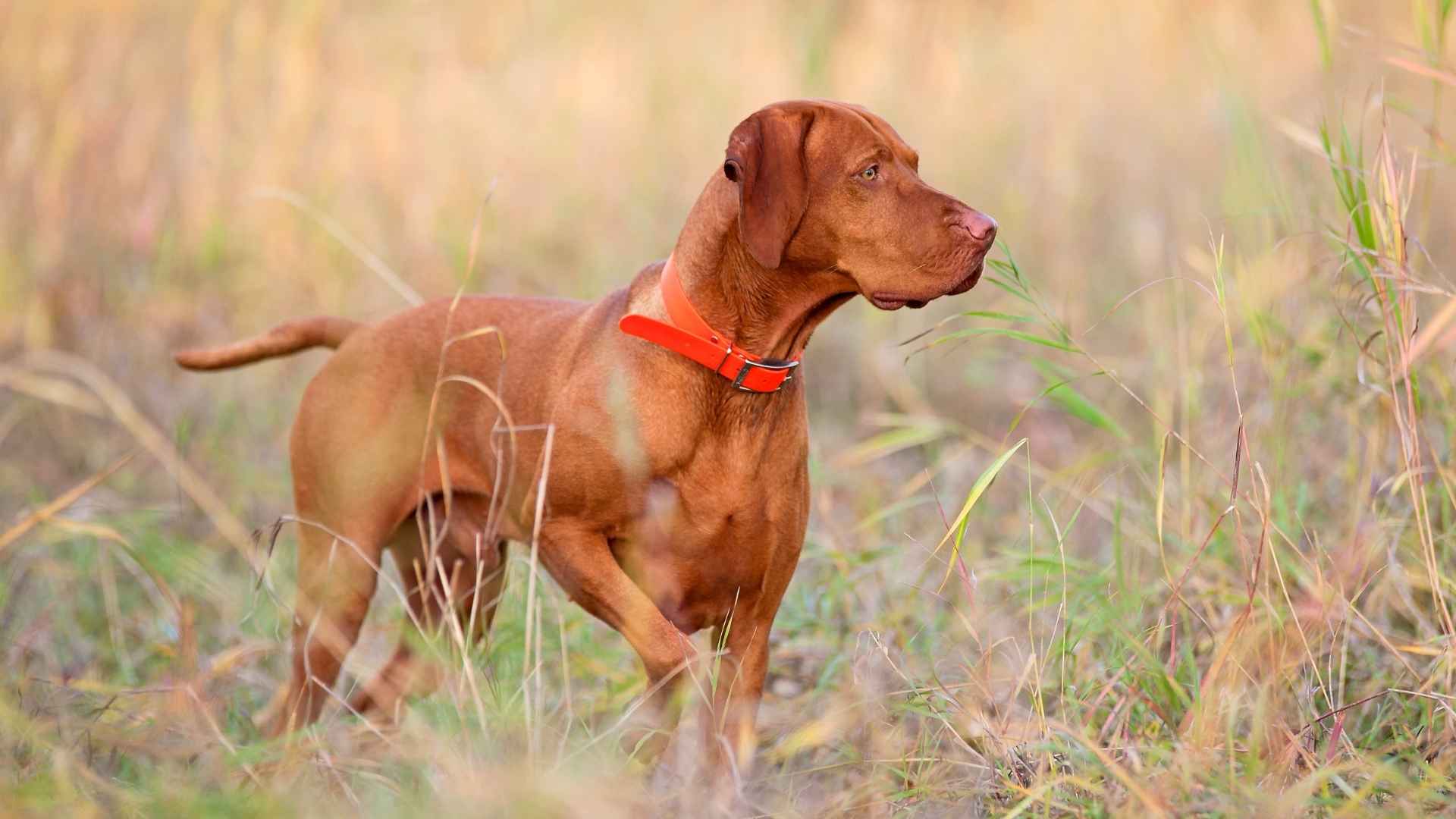When hunters pursue game, the skill of tracking wounded animals becomes crucial—not only to ensure a successful hunt but also to promote ethical hunting practices by minimizing animal suffering. This is where specially trained dogs shine, transforming their natural instincts into life-saving talents.
These remarkable breeds combine an extraordinary sense of smell with determination, focus, and endurance, enabling them to follow even the faintest trails left by injured wildlife. Whether navigating dense forests, rugged terrain, or vast open fields, these dogs act as invaluable partners, guiding hunters precisely and efficiently.
In this article, we dive into the top 10 dog breeds renowned for their tracking prowess in hunting scenarios. From classic scent hounds to versatile retrievers, each breed brings unique strengths that make them an exceptional tracker.
Ready to meet the canine heroes of the hunt? Let’s explore these breeds that turn scent into success!
Dog Breeds That Track Wounded Animals For Hunters
1. German Shepherd
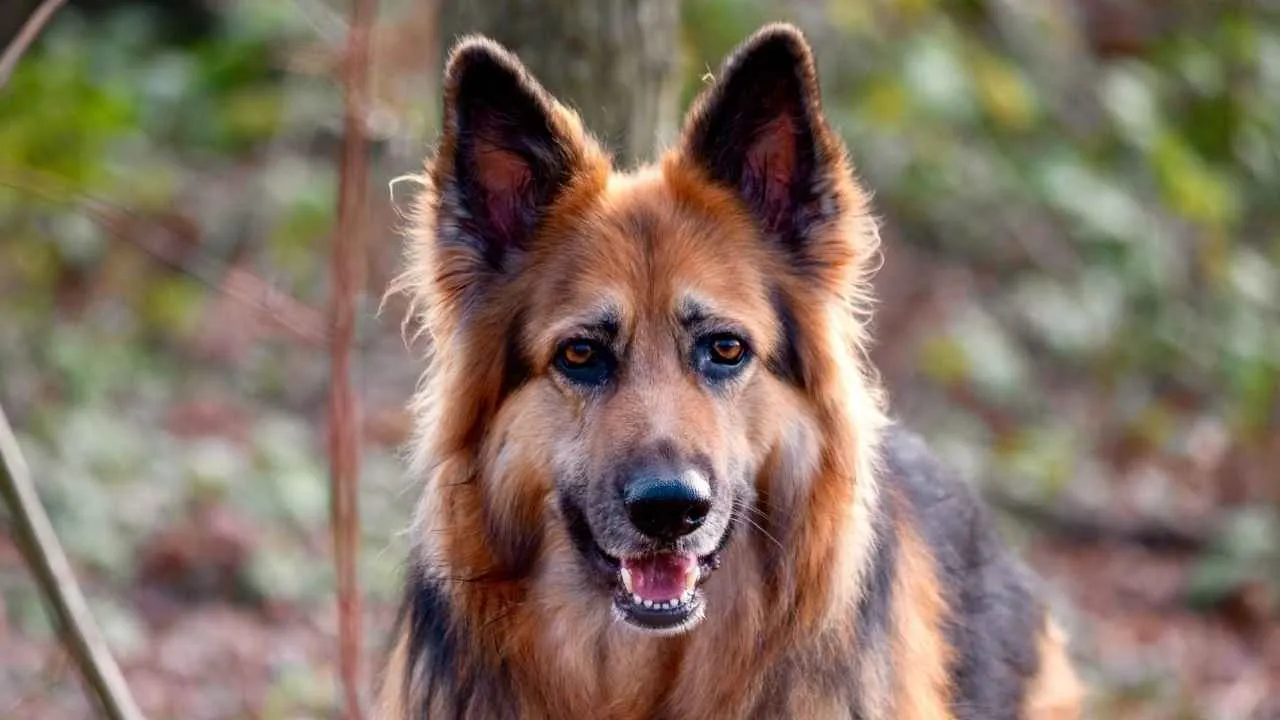
German Shepherds are renowned for their versatility and keen sense of smell, making them excellent trackers. Their intelligence and strong work ethic help them excel in various roles, from police work to search-and-rescue and hunting. They possess a natural instinct to follow scents, which hunters often train to track wounded animals efficiently.
This breed’s muscular build supports endurance and agility, allowing German Shepherds to navigate tough terrain without losing stamina.
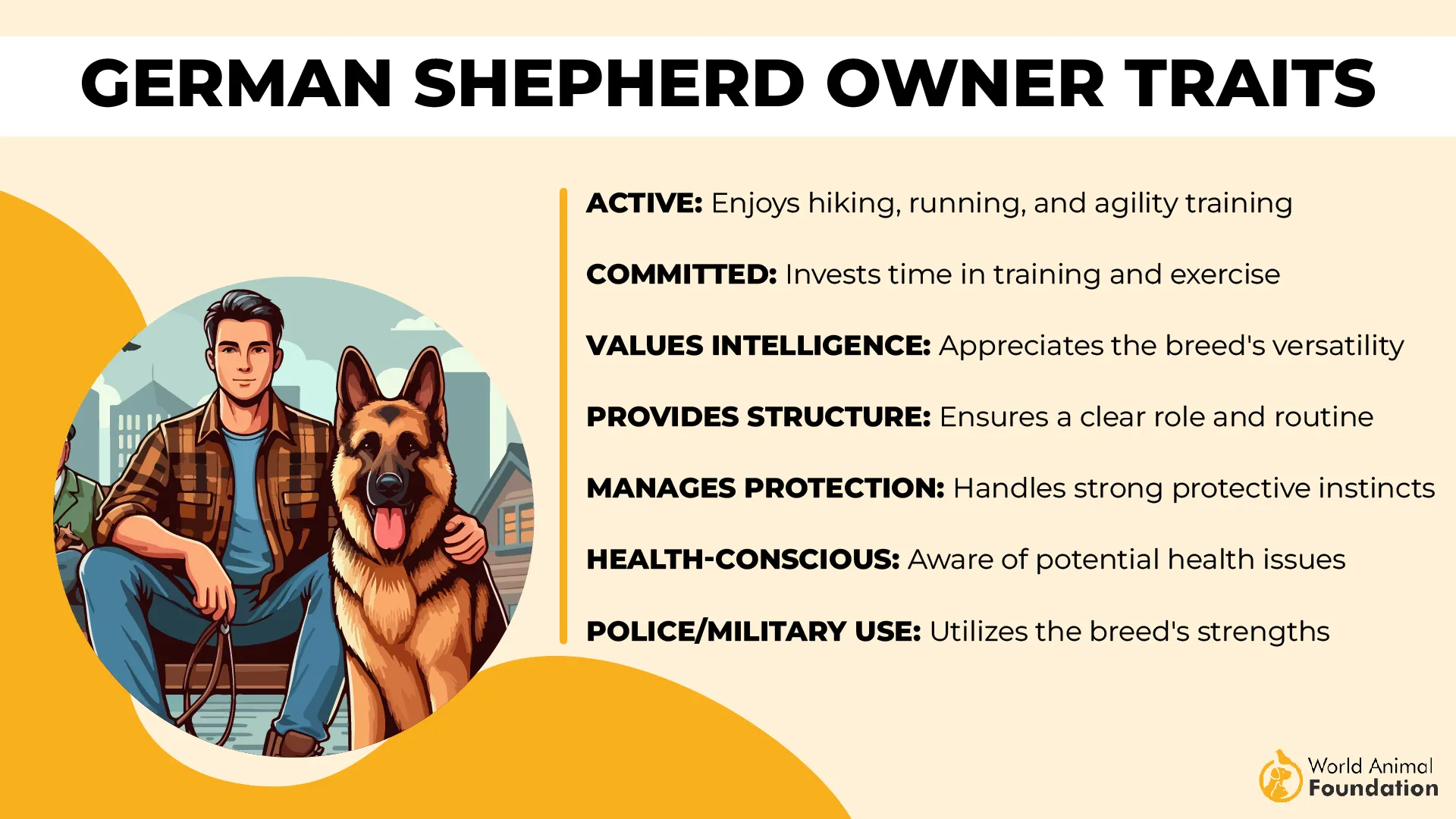
Their loyal nature also creates a strong bond with their handlers, crucial for following commands during tracking missions. German Shepherds require regular mental and physical stimulation to stay sharp, as boredom can lead to destructive behaviors.
Well-known for their protective instincts, German Shepherds are vigilant and alert, making them dependable companions in the field. Their thick double coat adapts well to different climates, providing comfort during extended outdoor work.

Overall, their blend of strength, intelligence, and scenting ability makes them a top choice for hunters needing reliable tracking dogs.
Quick Tips
Start scent training early to harness their natural tracking skills.
Provide consistent physical and mental challenges to keep them engaged.
2. Labrador Retriever
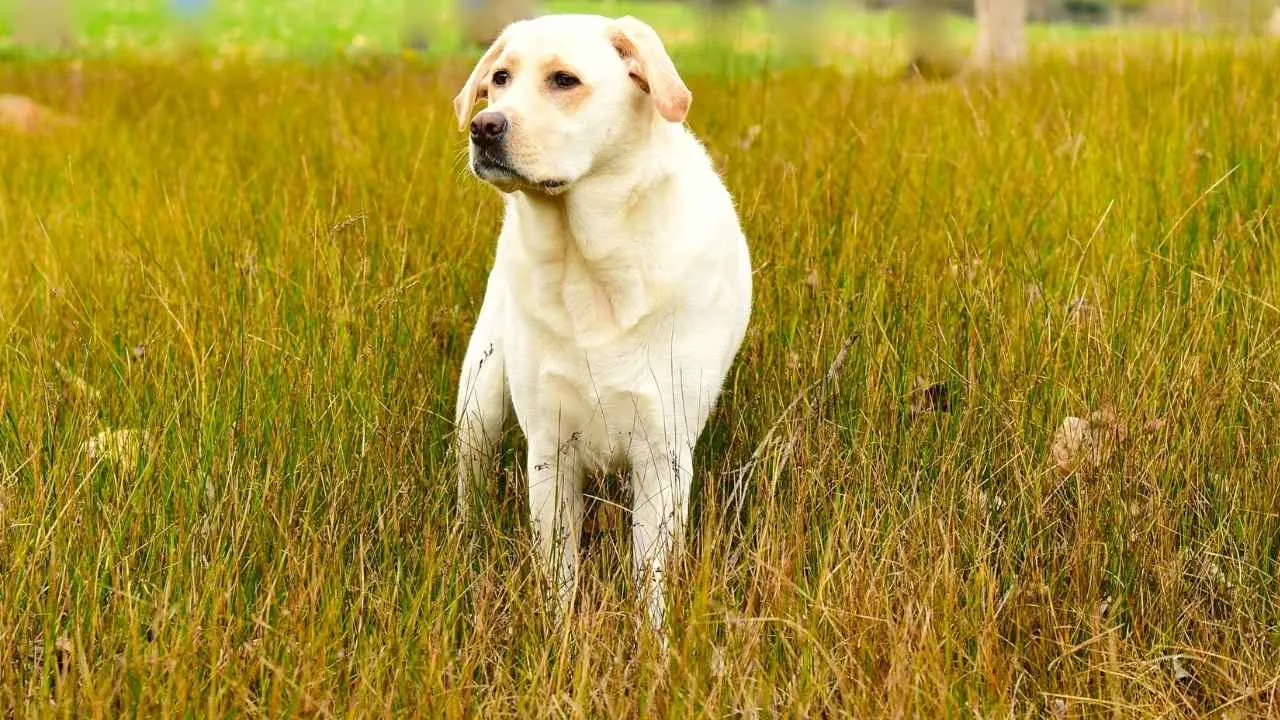
Labrador Retrievers are beloved for their friendly disposition and remarkable versatility. Their excellent nose and tracking ability make them valuable partners for hunters, especially in tracking wounded game over diverse terrains. Their eagerness to please and trainability ensure quick learning in scent-related tasks.
This breed’s athletic build and high energy levels contribute to impressive stamina during long tracking sessions.
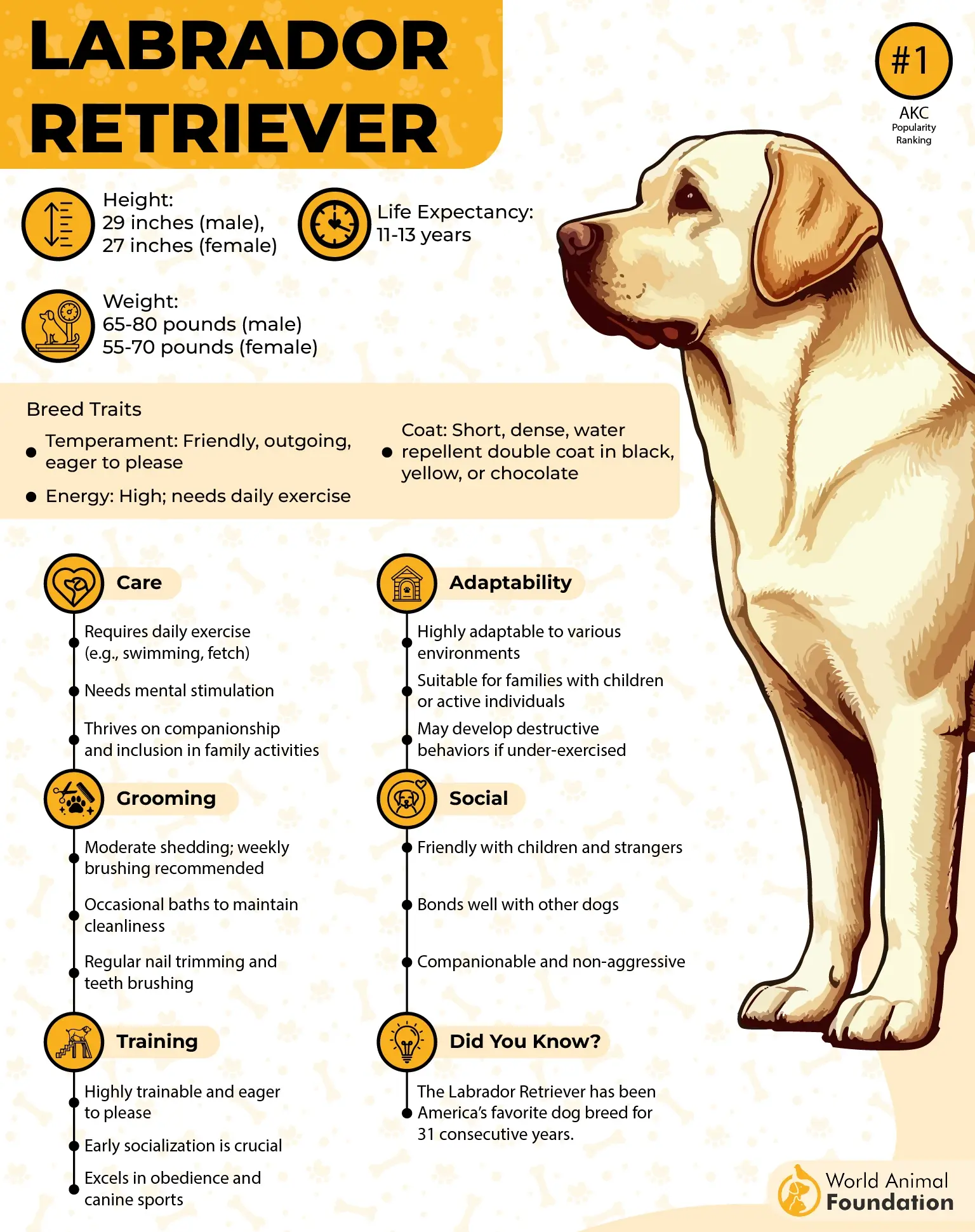
As per PetMD, Labradors are gentle and social, often thriving in family settings and working environments alike. Their short, dense coat provides good protection in wet and muddy conditions often encountered during hunts.
Beyond their tracking talent, Labradors also excel in retrieving, making them a dual-purpose breed for hunting expeditions. Their intelligence, paired with a calm temperament, allows them to focus intently on tracking tasks without getting distracted. This combination of traits solidifies their reputation as one of the best all-around hunting dogs.
Quick Tips
Use positive reinforcement training to enhance tracking skills effectively.
Keep exercise varied to maintain enthusiasm and physical readiness.
3. Bloodhound
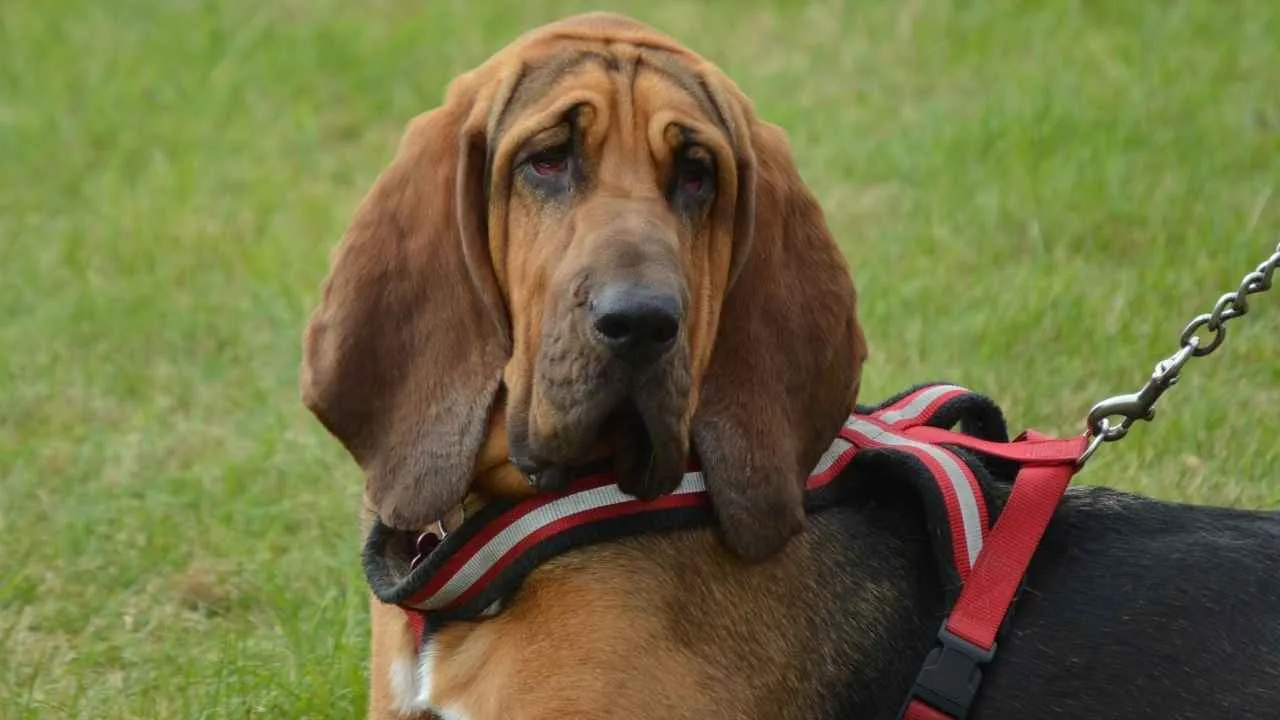
Bloodhounds are famous for their extraordinary scenting abilities, often regarded as the best tracking dogs worldwide. According to the AKC, their droopy ears and loose skin help trap scent particles, enhancing their ability to follow even the faintest trails. Hunters prize them for their persistence in tracking wounded animals over long distances.
This breed’s calm and patient nature supports long, methodical tracking sessions without losing focus. Bloodhounds are strong and sturdy, capable of handling rough environments and challenging weather.
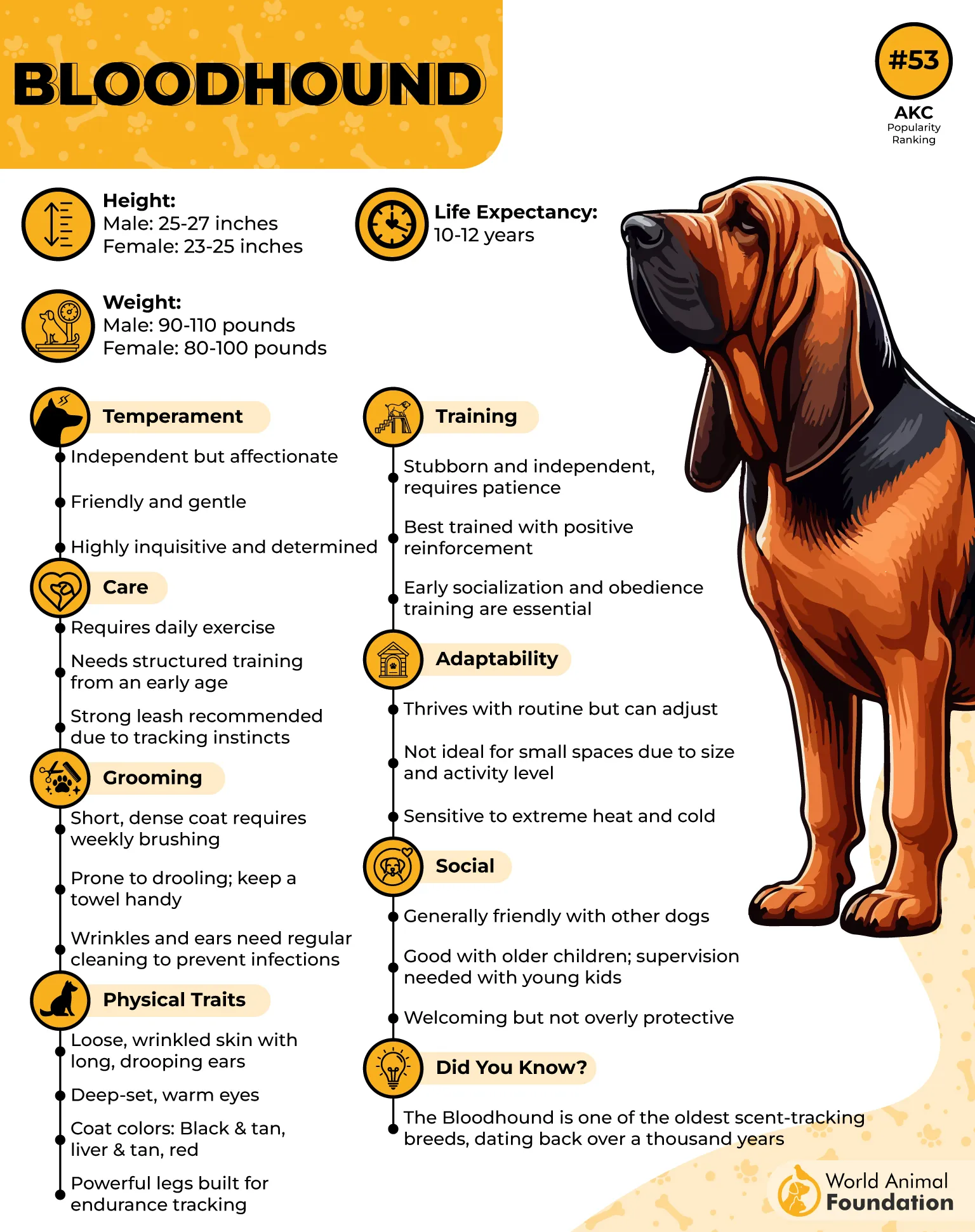
Their affectionate temperament makes them loyal companions beyond the field. While their nose is their standout feature, Bloodhounds also need gentle handling due to their sensitive and somewhat stubborn disposition.
Training requires patience but rewards handlers with a dependable and single-minded tracker. Their unique combination of scent power and endurance makes them a top choice for serious hunters.
Quick Tips
Begin scent training early and be patient with their learning curve.
Allow frequent breaks during long tracking to maintain their focus and energy.
4. Saint Bernard
Saint Bernards are typically known for rescue work in snowy conditions, but their tracking abilities also deserve recognition. Their large size and strength enable them to cover rugged terrain efficiently, and their calm demeanor helps them stay steady during tracking missions. Though less common in hunting, they can track wounded animals with proper training.
This breed has a thick, weather-resistant coat that protects them in cold and wet conditions. Their gentle temperament allows them to work closely with handlers without aggression or distractions.
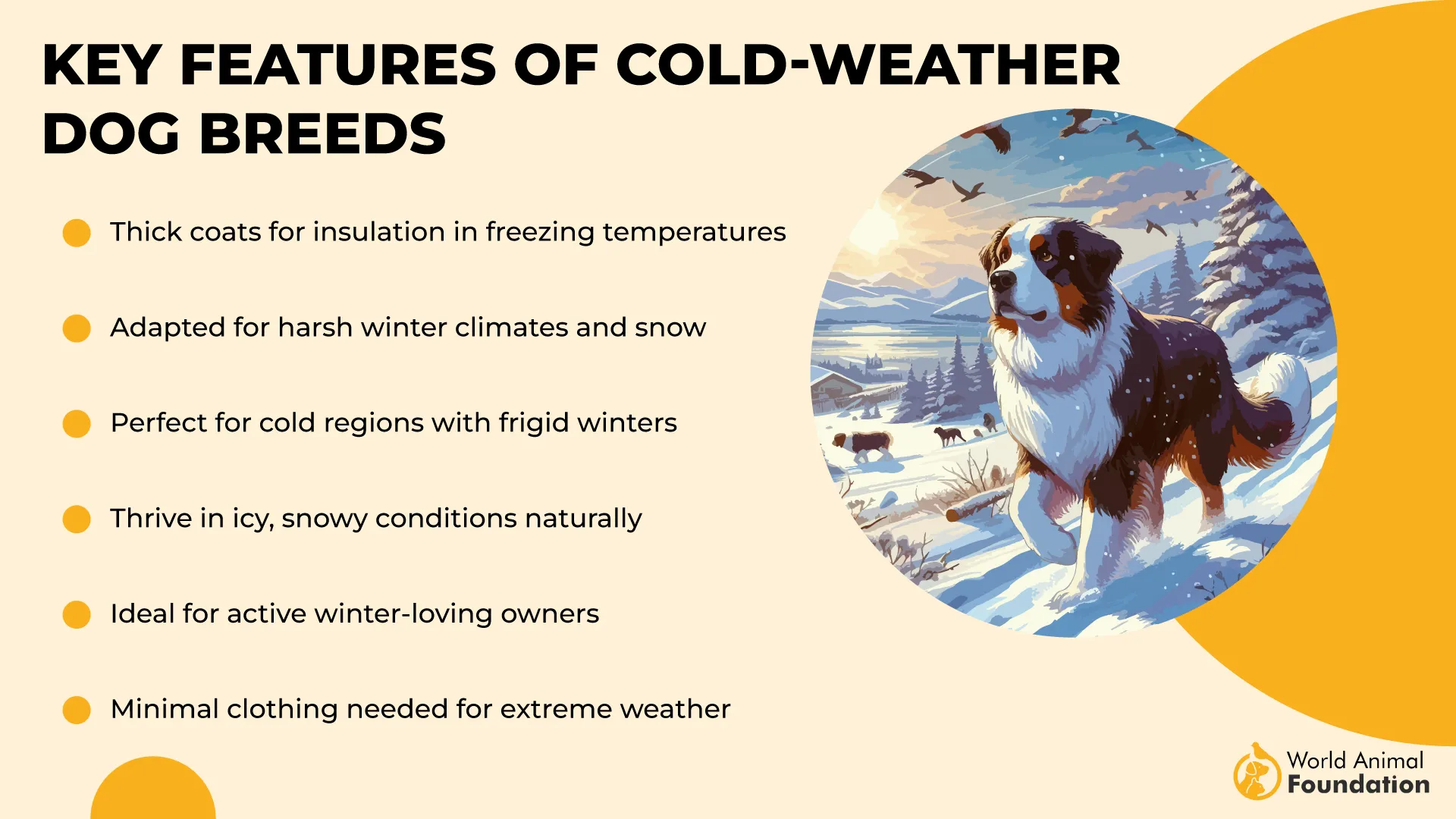
Saint Bernards are patient dogs, which aids in the slow and careful tracking needed in hunting scenarios. Because of their size, they require a handler who can manage and guide them effectively.
Despite their calm nature, they are surprisingly agile and can maintain steady endurance when tracking. Their combination of strength and patience offers hunters a unique tracking partner, especially in challenging environments.
Quick Tips
Socialize and train them early to enhance tracking responsiveness.
Manage their exercise to avoid joint strain, given their large frame.
5. Basset Hound
Basset Hounds boast one of the most sensitive noses in the canine world, making them excellent scent trackers. Their low stature and long ears are perfect for trapping scent particles close to the ground, allowing them to follow trails that others might miss. Hunters value their determination in tracking wounded game.
Despite their laid-back appearance, Bassets are persistent and focused when on a scent. Their short legs give them a slow but steady pace ideal for methodical tracking.
These dogs enjoy companionship and thrive in environments where their tracking skills are regularly exercised. Their stubborn streak can present training challenges, but consistent, patient guidance results in highly reliable trackers.
Basset Hounds’ calm demeanor makes them excellent for long tracking sessions where endurance and focus are essential. Their unique build and scenting abilities set them apart in the hunting world.
Quick Tips
Use firm, patient training techniques to work through their stubbornness.
Engage their nose daily with scent games to sharpen tracking instincts.
6. Redbone Coonhound
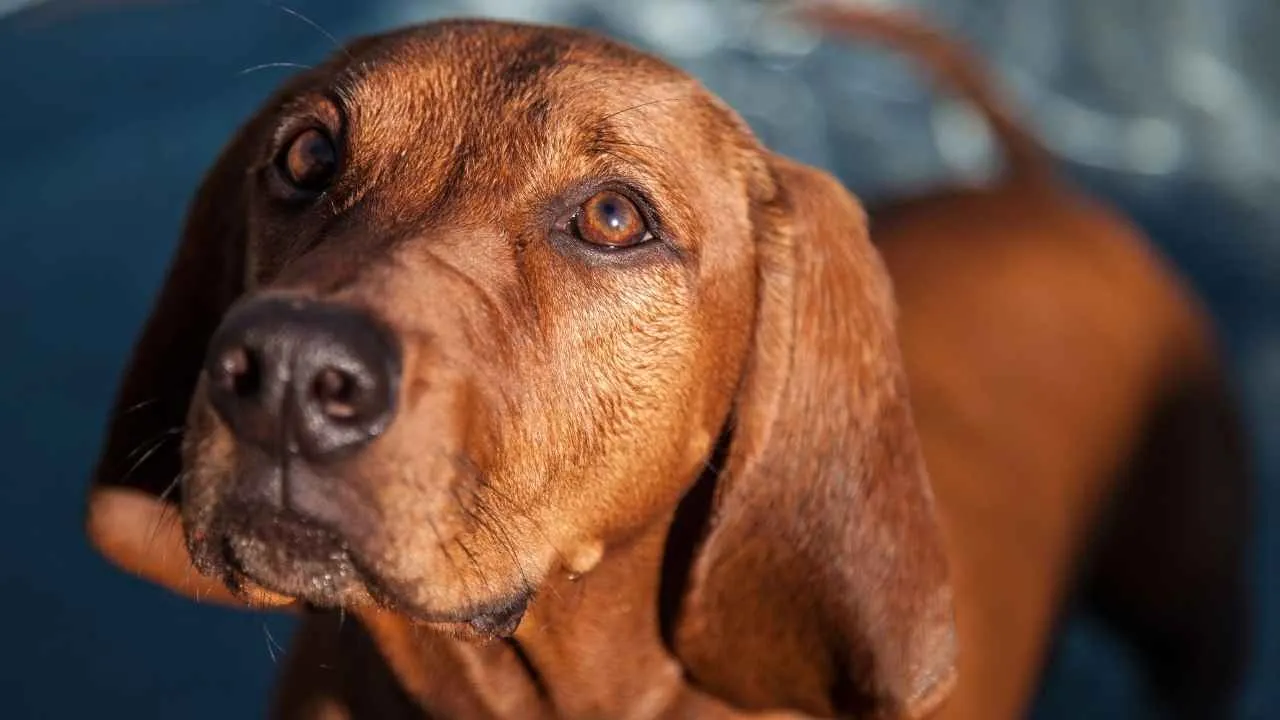
Redbone Coonhounds are exceptional scent hounds originally bred for hunting raccoons, deer, and even bears. Their powerful noses and stamina allow them to track wounded animals over long distances, making them trusted companions for hunters. This breed combines agility with a smooth, muscular build suited for navigating dense forests.
Known for their striking reddish coat, Redbone Coonhounds have an affectionate and loyal nature, forming close bonds with their families. Their independent streak means they can be stubborn, but their intelligence makes them responsive to firm, consistent training. They thrive on physical activity and mental challenges to stay balanced.
With a calm yet determined personality, these dogs excel in tracking scenarios where focus is critical. Their deep baying voice helps hunters locate them when they are on a trail, a valuable feature in thick woods or uneven terrain. Redbones adapt well to various environments, reflecting their versatility as hunting dogs.
Their combination of endurance, scenting ability, and loyalty makes Redbone Coonhounds exceptional hunting partners. Their adaptability means they perform well not only in forests but also in open fields or rugged terrain. Proper training and regular exercise keep this breed at peak performance.
Quick Tips
Use scent-based games to stimulate their natural tracking instincts regularly.
Provide firm, consistent leadership to manage their independent nature effectively.
7. American Foxhound
The American Foxhound was developed for tracking foxes over wide open spaces, combining speed with endurance. Their lean, athletic frame allows them to pursue scents quickly while maintaining stamina through long hunts. This breed is known for its clear, melodious bay, which aids hunters in locating them while on a trail.
They are friendly and calm dogs at home, but require ample exercise to channel their natural energy. Their social nature makes them good companions with both people and other dogs. Their short coat is easy to maintain and holds up well against various weather conditions.
WebMD states that American Foxhounds are driven scent trackers, relying on a keen nose and focus to follow game. Training emphasizes voice control and recall to keep them responsive during hunts. Their patience and stamina make them reliable partners when tracking wounded animals.
Their versatility extends beyond hunting, thriving in active households where they receive regular physical and mental stimulation. They adapt well to different hunting environments, from fields to woods, showcasing their tracking skills effectively.
Quick Tips
Encourage long, regular exercise sessions to manage their high energy.
Reinforce recall and voice commands to maintain control in the field.
8. Cocker Spaniel
Cocker Spaniels are known primarily as bird dogs, but they also have sharp noses suited for tracking wounded game. Their small size and agility allow them to move swiftly through dense brush and tight spots, making them ideal for hunting in varied terrains. Their silky coat requires consistent grooming to keep it healthy.
This breed thrives on human interaction and quickly learns scent-related tasks through positive training. Their expressive eyes and alert posture reflect a natural eagerness to work and please their handlers. Cocker Spaniels combine intelligence with a gentle disposition, which supports effective training.
Their sensitive nature means they respond best to gentle guidance and encouragement. Despite their smaller stature, they show surprising stamina and determination during tracking activities. They are versatile dogs who do well in both family settings and working roles.
The breed’s adaptability and keen sense of smell make it excellent for hunters who want a compact but capable tracking partner. Their friendly temperament and quick learning make them a joy to train and live with.
Quick Tips
Use reward-based training to nurture confidence and focus.
Maintain regular grooming to protect their coat and skin health.
9. Beagle
Beagles are celebrated for their relentless scent tracking and strong hunting instincts. Their compact and muscular build allows them to follow trails steadily for long periods. Beagles have a distinctive, melodious howl which helps hunters track their location during a chase.
Friendly and curious, Beagles make excellent family pets while maintaining a strong drive for scent work. They are social dogs, enjoying the company of both people and other animals. Their short coat is low-maintenance and durable in outdoor conditions.
Training Beagles requires patience, as their independent streak can lead to distraction. However, their determination ensures they don’t give up easily on a scent. This tenacity makes them reliable for following wounded game across challenging terrain.
Their natural curiosity, combined with a strong nose, gives Beagles an edge as trackers. Providing them with plenty of scent games and exercise helps keep their focus sharp and behavior balanced.
Quick Tips
Incorporate daily scent activities to channel their tracking instincts.
Practice consistent, patient training to handle their independent nature.
10. German Shorthaired Pointer
German Shorthaired Pointers are athletic, versatile hunting dogs well known for their tracking, pointing, and retrieving abilities. Their lean, muscular build supports speed and endurance, making them highly effective in tracking wounded animals across diverse terrains. Their short, dense coat offers protection and ease of maintenance.
This breed learns quickly and enjoys varied training activities, responding well to challenges that engage both mind and body. Their friendly and loyal nature fosters a close bond with handlers, which is essential for teamwork during hunts. They thrive in active environments where their energy is well used.
With a sharp nose and intense focus, German Shorthaired Pointers are dependable trackers who adapt to multiple hunting styles. Their versatility extends beyond tracking, contributing to their popularity among hunters who need a multi-talented dog.
Proper exercise and consistent training are vital to keep this breed happy and effective. Their endurance and intelligence make them one of the best all-around hunting companions.
Quick Tips
Provide diverse training exercises to maintain enthusiasm and skill.
Ensure daily high-energy activity to meet their physical demands.
Conclusion
Tracking wounded deer or other game animals is a challenging task that requires a dog with a great nose and natural instinct for following a blood trail. Blood tracking dogs excel at sniffing out the faintest scent of blood, giving hunters the best chance to locate a hurt buck, rabbit, or other deer quickly and humanely. Whether tracking through thick brush, open land, or near waterfowl habitats, these dogs navigate diverse environments day or night with focus and endurance.
From big dogs with floppy ears like Bloodhounds to smaller breeds whose size makes them agile in dense terrain, each blood tracking dog offers unique strengths. Labs and other popular hunting breeds combine intelligence and loyalty, making them versatile partners. Early training with a leash helps pups build a strong bond with their owner and learn vital skills for successful blood trailing.
Whether hunting birds or tracking wounded deer, these dogs provide invaluable assistance by improving the chances of a clean, ethical shot and a swift recovery. With proper care from a veterinarian and consistent training, blood tracking dogs become trusted hunting companions, ready to catch the trail whenever duty calls.


